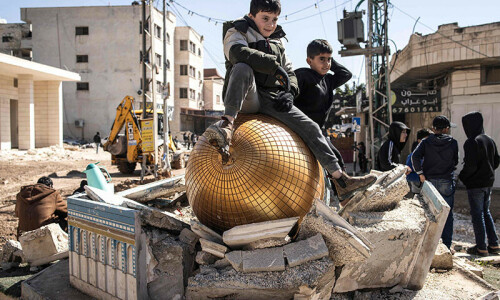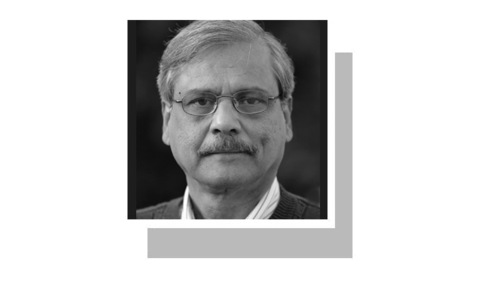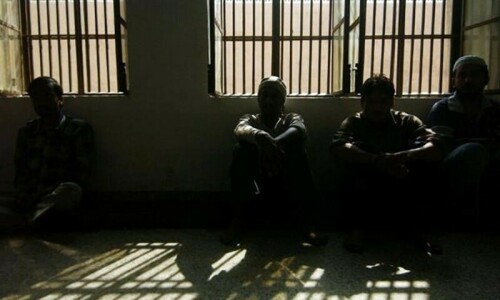 DHAKA, Nov 12: The 13th Saarc summit on Saturday called for greater cooperation within the region to deal with the aftermath of disasters like the Oct 8 earthquake and the last year’s devastating tsunami.
DHAKA, Nov 12: The 13th Saarc summit on Saturday called for greater cooperation within the region to deal with the aftermath of disasters like the Oct 8 earthquake and the last year’s devastating tsunami.
All the seven South Asian leaders addressing the opening ceremony termed terrorism a major concern of the region and pledged to curb it by ‘wholeheartedly’ cooperating with each other.
They also underlined the need for extensive economic cooperation for the well-being of the large number of people who are still mired in poverty.
The summit was declared open at 11:30am in the Bangladesh-China Friendship Conference Centre by Prime Minister Shaukat Aziz, the outgoing chairman of the South Asian Association for Regional Cooperation (Saarc). The summit began amid tight security in and around Dhaka.
The Saarc leaders expressed concern over natural calamities that had often devastated the countries in the region. They expressed the hope for evolving a mechanism to tackle natural disasters and mitigate the suffering caused by them.
After his speech, Prime Minister Aziz handed over the chair to Khaleda Zia, the Bangladesh prime minister. Other leaders sat on the dais were Prime Ministers Manmohan Singh of India and Lyonpo Sangay Ngedup of Bhutan, Presidents Chandrika Bandaranaike Kumaratunga of Sri Lanka and Maumoon Abdul Gayoom of the Maldives and King Gyanendra Bir Bikram Shah Dev of Nepal.
The summit began with the observation of one minute’s silence to pay respect to the victims of the Asian tsunami and the Oct 8 quake in Pakistan and India.
Poverty alleviation, disaster prevention, curbing terrorism, introduction of a South Asian Free Trade Area and expansion of the association are the major issues that the Dhaka summit is expected to deliberate upon.
Before the opening of the summit, the leaders visited the National Mausoleum to pay homage to those who had laid down their lives in the Bangladeshi War of Independence in 1971 and also the grave of former president Ziaur Rahman, who had mooted the idea of a South Asian regional forum.
Prime Minister Khaleda Zia, who took over as the Saarc chairperson for a year, blamed the mindsets emanating from the past for deterring effective cooperation by Saarc members. She called for simultaneous action on political and economic fronts to improve the lot of the region’s 1.5 billion people.
She made a strong plea for implementing three programmes to address poverty on a regional scale.
The BD leader said that Safta agreement should take effect, as agreed upon, from January next year to realize the forum’s key objective of accelerating economic growth.
She termed poverty alleviation the focus of all Saarc activities and stressed the need for implementing the Plan of Action on Poverty Alleviation adopted at Islamabad in 2002, the Report of the Independent South Asian Commission on Poverty Alleviation and the Saarc Development Goals as instruments to eradicate poverty.
Inaugurating the summit earlier, Prime Minister Aziz said: “The South Asian states have remained embroiled in conflict management. We need to move towards conflict resolution.”
He urged the Saarc leaders to demonstrate political will to sustain the momentum generated since the Islamabad summit two years ago.
“We should build on areas of convergence, minimize divergences and, most of all, seek to augment complementarities for the greater good of the peoples of this region.”
Mr Aziz suggested promoting cooperation in the field of energy, environment protection, improvement of infrastructure and coordination in monetary and fiscal policies of the Saarc member-states.
Indian Prime Minister Manmohan Singh, in his speech, stressed the need to overcome ‘historical divisions’ for a mutually beneficial economic partnership, saying that cooperation under Saarc over the past two decades had fallen far short of expectation.
“There is an imperative need to change and overcome the divisions of history and politics to forge a new architecture of mutually beneficial economic partnership.
“I hope Safta comes into force by January 1, 2006, but even this will represent only a modest beginning in terms of our goal of regional cooperation,” He said.
He said more liberal movement of people and goods across borders also required greater sensitivity on the part of all member countries to pressing concerns. No member country should allow its territory to be used against the interest of another member country, he added.















































